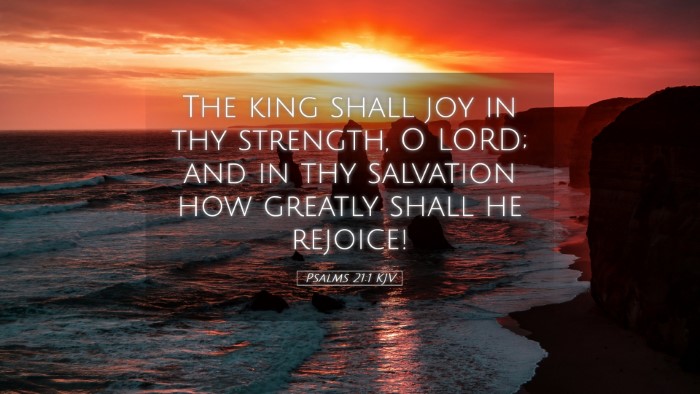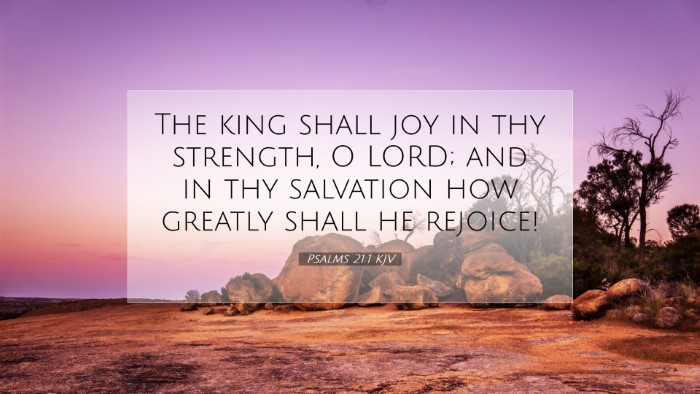Psalms 21:1 Commentary
Verse: "The king shall joy in thy strength, O Lord; and in thy salvation how greatly shall he rejoice!"
Introduction
This verse serves as a powerful proclamation of the relationship between divine strength and the joy it brings to the king. It expresses a deep dependency on God, affirming that true happiness and victory come only through divine salvation. The Psalm conveys a strong thematic essence of thanksgiving and reliance upon God, which can be crucial for spiritual leaders, theologians, and scholars to study.
Historical Context
The Psalm is traditionally attributed to David, who often found himself in situations where he counted on God's help and strength. It reflects a reflective moment in which the king acknowledges and celebrates the power of God in his leadership and victories.
- David's Leadership: David was a warrior king whose engagements often drew him closer to God, especially during times of crisis.
- Covenantal Promises: The promises made to David established a legacy of divine kingship which is echoed throughout the psalm.
Thematic Analysis
The thematic core of this verse is the intertwined nature of kingly authority and divine sovereignty. It speaks to several essential themes:
- Joy in Divine Strength: The king's joy is not rooted in his own accomplishments but in the strength provided by God, emphasizing a broader theological principle—that human success stems from divine grace.
- Rejoicing in Salvation: Salvation here signifies not just deliverance from peril but also an active, continual dependence upon God’s redemptive power. The rejoicing indicates a response to God’s ongoing work in granting victories.
- Corporate Worship: This verse can also be seen as part of a larger liturgy meant to encourage the community, as its message is rooted in collective triumph and hope.
Commentary Insights
Matthew Henry's Commentary
Matthew Henry remarks on the king's joy as an expression of gratitude for the help God provides. He emphasizes the magnitude of joy experienced when one realizes their strength comes from divine sources. Henry notes that the divine assistance is essential in governance and warfare, and such reliance is fundamental for rulers.
Albert Barnes' Commentary
Barnes elaborates on the structure of the verse, suggesting it serves as both an affirmation of personal faith and a public declaration of God's providential authority. He indicates that the joy derived from God's salvation is comprehensive, affecting every aspect of the kingly office, embodying hope in both personal and national spheres. The act of rejoicing reflects a healthy acknowledgment of divine sovereignty where the king attributes his successes to God.
Adam Clarke's Commentary
Clarke offers insight into the emotional and theological gravity of the statement. He suggests that the joy expressed by the king is not superficial but deeply rooted in recognition of God’s intervention in critical moments of his reign. Clarke emphasizes the need for leaders to remember (and demonstrate) this dependence on God across personal, political, and spiritual realms of their lives.
Theological Implications
The implications of Psalms 21:1 are considerable for today's pastors and church leaders:
- Leaders as Servants: The joy of leadership should stem from recognizing God as the sovereign source of strength. This verse encourages leaders to approach their roles as servants under God's authority.
- Celebration of Deliverance: In worship settings, rejoicing in God's salvation can inspire congregational unity and strengthen social bonds, reminding church communities of their collective experiences of divine grace.
- Dependence on God: The theme of reliance on divine strength speaks to modern challenges faced by leaders, urging them to remain humble and dependent on God amid increasing pressures.
Conclusion
The verse openly encapsulates a profound truth: the joy of leadership comes not from personal achievements but from recognizing and rejoicing in God's unwavering strength. This perspective shifts the focus of joy from self to God, encouraging both leaders and their congregations to continuously celebrate divine intervention and salvation in their lives.


